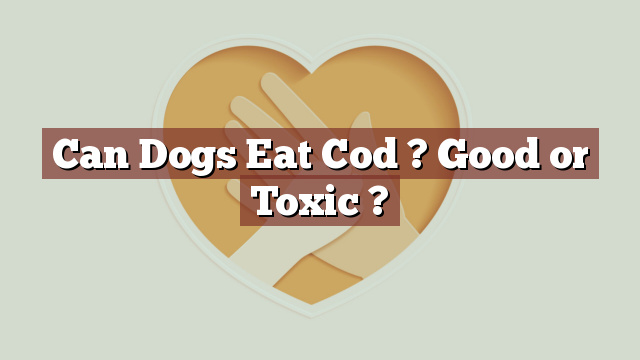Can Dogs Eat Cod? Good or Toxic?
It is essential for pet owners to be aware of what foods are safe and suitable for their furry friends. With the multitude of options available, it can be challenging to determine which foods are appropriate for dogs’ health. One such food that often raises questions is cod, a popular type of fish. In this article, we will explore whether dogs can eat cod, the potential risks or benefits associated with its consumption, and what to do if your dog accidentally ingests it.
Nutritional Value of Cod: What Does it Offer to Dogs?
Cod is a nutritious fish that can provide several essential nutrients to dogs. It is a great source of high-quality protein, which is crucial for muscle development and repair. Additionally, cod is rich in omega-3 fatty acids, which are beneficial for a healthy coat, joint function, and overall well-being. This fish also contains vitamins such as vitamin B12 and minerals like selenium and phosphorus, which contribute to optimal canine health.
Can Dogs Eat Cod? Unveiling the Safety of this Fish for your Furry Friend
Yes, dogs can eat cod. Cod is generally safe for dogs to consume as long as it is properly cooked and served in moderation. However, it is important to note that some dogs may have individual sensitivities or allergies to fish. If you have never given your dog cod before, it is advisable to introduce it gradually into their diet and monitor for any adverse reactions such as gastrointestinal upset or skin irritations. As with any new food, it is always best to consult with your veterinarian before adding it to your dog’s regular meals.
Potential Risks or Benefits: Exploring the Impact of Cod Consumption on Dogs
When fed in appropriate amounts, cod can offer various health benefits to dogs. The omega-3 fatty acids found in cod have anti-inflammatory properties, which can help alleviate symptoms of arthritis and other joint issues. These fatty acids can also support heart health and contribute to a shiny, lustrous coat in dogs. However, it is crucial to ensure that cod is not the sole source of nutrition for your dog, as a well-balanced diet consisting of other essential nutrients is necessary for their overall health.
While cod is generally safe for dogs, there are some potential risks associated with its consumption. Fish bones can pose a choking hazard or cause internal injuries, so it is crucial to remove all bones before feeding cod to your dog. Additionally, excessive consumption of cod can lead to an imbalance in nutrients, particularly if it replaces other essential components of your dog’s diet. Therefore, moderation is key when including cod in your dog’s meals.
My Dog Ate Cod, What Should I Do? Steps to Take in Case of Accidental Ingestion
If your dog accidentally ingests cod, there are a few steps you can take to ensure their safety. Firstly, assess the situation and check for any signs of distress or discomfort. If your dog exhibits symptoms such as vomiting, diarrhea, or difficulty breathing, it is crucial to seek immediate veterinary assistance. In case your dog has consumed fish bones, it is advisable to contact your veterinarian, as they may need to evaluate your dog for potential injuries or perform necessary procedures to remove the bones.
Conclusion: Should Dogs Include Cod in Their Diet? Weighing the Pros and Cons
In conclusion, dogs can safely eat cod as part of a well-balanced diet. Cod offers various nutritional benefits, including protein, omega-3 fatty acids, vitamins, and minerals. However, it is important to serve cod in moderation, remove all bones, and ensure it does not replace other essential components of your dog’s diet. As with any dietary change, it is always wise to consult your veterinarian before introducing cod or any new food into your dog’s regular meals. By considering the potential risks and benefits of cod consumption for dogs, you can make informed decisions about your furry friend’s diet and overall well-being.
Thank you for investing your time in exploring [page_title] on Can-Eat.org. Our goal is to provide readers like you with thorough and reliable information about various dietary topics. Each article, including [page_title], stems from diligent research and a passion for understanding the nuances of our food choices. We believe that knowledge is a vital step towards making informed and healthy decisions. However, while "[page_title]" sheds light on its specific topic, it's crucial to remember that everyone's body reacts differently to foods and dietary changes. What might be beneficial for one person could have different effects on another. Before you consider integrating suggestions or insights from "[page_title]" into your diet, it's always wise to consult with a nutritionist or healthcare professional. Their specialized knowledge ensures that you're making choices best suited to your individual health needs. As you navigate [page_title], be mindful of potential allergies, intolerances, or unique dietary requirements you may have. No singular article can capture the vast diversity of human health, and individualized guidance is invaluable. The content provided in [page_title] serves as a general guide. It is not, by any means, a substitute for personalized medical or nutritional advice. Your health should always be the top priority, and professional guidance is the best path forward. In your journey towards a balanced and nutritious lifestyle, we hope that [page_title] serves as a helpful stepping stone. Remember, informed decisions lead to healthier outcomes. Thank you for trusting Can-Eat.org. Continue exploring, learning, and prioritizing your health. Cheers to a well-informed and healthier future!

